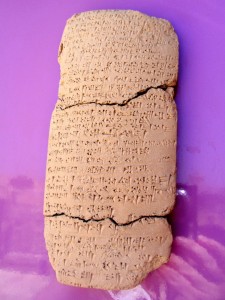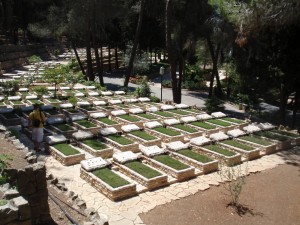Although even some liberal Bible scholars stab at biblical history, claiming for example that the Exodus account is made-up, or that some of the patriarchs didn’t exist, time and again archaeology has confirmed the Bible’s authenticity.
In Jeremiah 43, we read about the Lord’s impending judgment on Judah (the Israelites had abandoned their worship of God, and began to follow after man-made gods, such as Baal). Jeremiah, the prophet born a few miles west of Jerusalem, was tasked with telling the people some hard news: they would be punished severely, including an invasion by the Babylonians.

They were also warned not to flee to Egypt, to safety, lest the Lord follow them there and destroy them. It is interesting to note that the people did this very thing:
So they came into the land of Egypt: for they obeyed not the voice of the Lord: thus came they even to Tahpanhes.
Then came the word of the Lord unto Jeremiah in Tahpanhes, saying,
Take great stones in thine hand, and hide them in the clay in the brickkiln, which is at the entry of Pharaoh’s house in Tahpanhes, in the sight of the men of Judah;
And say unto them, Thus saith the Lord of hosts, the God of Israel; Behold, I will send and take Nebuchadrezzar the king of Babylon, my servant, and will set his throne upon these stones that I have hid; and he shall spread his royal pavilion over them.
And when he cometh, he shall smite the land of Egypt, and deliver such as are for death to death; and such as are for captivity to captivity; and such as are for the sword to the sword.
And I will kindle a fire in the houses of the gods of Egypt; and he shall burn them, and carry them away captives: and he shall array himself with the land of Egypt, as a shepherd putteth on his garment; and he shall go forth from thence in peace.
He shall break also the images of Bethshemesh, that is in the land of Egypt; and the houses of the gods of the Egyptians shall he burn with fire. (Jeremiah 43:7-13)
Further, one can trace “secular history” and see that this is the general time in which the Egyptian empire began to wane. This coincided with the rise of the Roman empire.
It is unpopular today in the American church to talk about God’s judgment and wrath. More often than not on a given Sunday, a pastor will talk about God’s grace, mercy, and great plan for your life. But His rules for living and his sure justice are also important components of His nature, and it is a great shame that in the 21st century, people want to forget that, or ignore it.
Recently, two clay bullae were found in Jerusalem excavations, and they bear the names of two men — Shelemiah and Gedaliah — two ministers in the kingdom of King Zedekiah. These men are mentioned in the Bible as not liking Jeremiah’s proclamations against the Kingdom of Judah. In Jeremiah 38, we read about them having Jeremiah thrown into a pit.
Truly, human nature never changes, even over millennia. And the more people try to disprove the God of the Bible, the more He rises to meet and overwhelm that challenge.

